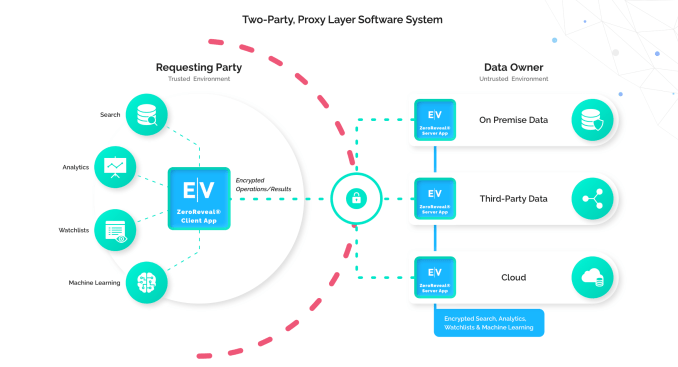Enveil, a provider of encrypted, privacy-focused search and analytics tools, raises $25M
Collectively, as we mature as a digital society, many of us are getting more aware, and more wary, of how our profiles and information exist and are used (and misused) online. A similar theme has also been playing out in the enterprise world, where organizations have also grown their security and data protection profiles to […]

Collectively, as we mature as a digital society, many of us are getting more aware, and more wary, of how our profiles and information exist and are used (and misused) online. A similar theme has also been playing out in the enterprise world, where organizations have also grown their security and data protection profiles to help defend themselves against malicious activity. Today, a B2B startup called Enveil, which is aiming to build a new array of data products — based on homomorphic encryption and secure multiparty computation — to ensure their users’ data privacy, is announcing a round of funding that includes a number of big-name strategic backers, underscoring the demand for such tools in the market among enterprises and the opportunities ahead.
The startup has raised $25 million, a Series B that is being led by insurance and financial services giant USAA, with Mastercard, Capital One Ventures, C5 Capital, DataTribe, the CIA’s strategic investment arm In-Q-Tel, Cyber Mentor Fund, Bloomberg Beta, GC&H, and 1843 Capital also participating.
You’ll notice that the list includes a number of very large, high-profile organizations, and Ellison Anne Williams, Enveil’s founder and CEO, confirmed to me that they not just financial backers, but also paying customers. They, plus a number of others like them, have driven a 300% increase in revenue since Enveil raised its Series A in February 2020. It’s now raised $40 million in total.
Enveil’s big pitch is that it is one of a very small handful of security startups that’s been working to commercialize the concept of homomorphic encryption. This is an approach to data privacy that was developed initially in a hypothetical context by researchers — in essence, it’s a cryptographic approach that involves encrypting with mathematical calculations to let companies analyze and use encrypted data without needing to decrypt it — and for some it’s most notable as a kind of holy grail concept that for many years looked like it might actually be impossible to execute.
Williams notes that Enveil has proven those naysayers wrong by indeed finding ways to apply the concepts, along with those from other privacy-enhancing tools such as secure multiparty computation, in commercial products. (Note: it’s not the only one: others include Duality, IBM, and Paris-based Zama.)
“Skepticism is awesome because it gives us a lot of opportunity to prove them wrong,” she said. “Our IP and what is special is how you take the addition and multiplication central to encryption and build them into complex business functionality.”
Enveil currently offers two products, which are both marketed under its “ZeroReveal” brand: first, an encrypted search tool that lets users keep encryption in searches even when they are made outside of their own network of apps; and second, machine-learning tool, which the company notes “enables advanced decisioning through collaborative and federated machine learning in a secure and private capacity.”
Given that one of the issues with working with machine learning algorithms has been the true anonymization of data; and that another has been companies and regulators adhering much more strictly to data silos to protect information — while at the same time looking for more benefits for collaboration — this is potentially a critical breakthrough.

Image Credits: Enveil (opens in a new window)
The idea with the investment is that it will be going towards the startup expanding that list of products, although Williams would not be drawn out on what those might be. It will also be investing in sales and marketing to expand its customer base.
The illustration above spells out where a company like Enveil is building a much-needed set of tools: data silos are well and good when data exchange is involving information and work that relates directly to others within your team or potentially wider organization, but there remain a lot of challenges for figuring out how to source data, or give information, when speaking with people or entities outside of your organization, whether they be other businesses or consumers, when you cannot account for their own security profiles.
That is especially important for businesses dealing in sensitive financial or health-related services. (And companies like USAA face this every day, with a host of scammers impersonating organizations like these preying on unassuming users.) This leaves a bit opportunity for building out new kinds of approaches that essentially let organizations take an approach where security remains intact regardless, although it will likely be years before we can develop infrastructure that can bypass bad judgment.
“Data is the backbone of the digital economy, but the market is experiencing a crisis of trust that restricts the ways in which data can be used,” said Nathan McKinley, VP of USAA corporate development, in a statement. “Enveil’s ZeroReveal solutions are changing the data usage landscape by enabling sensitive business and mission functions at scale today, and we’re excited to help push those efforts forward through this investment.”







